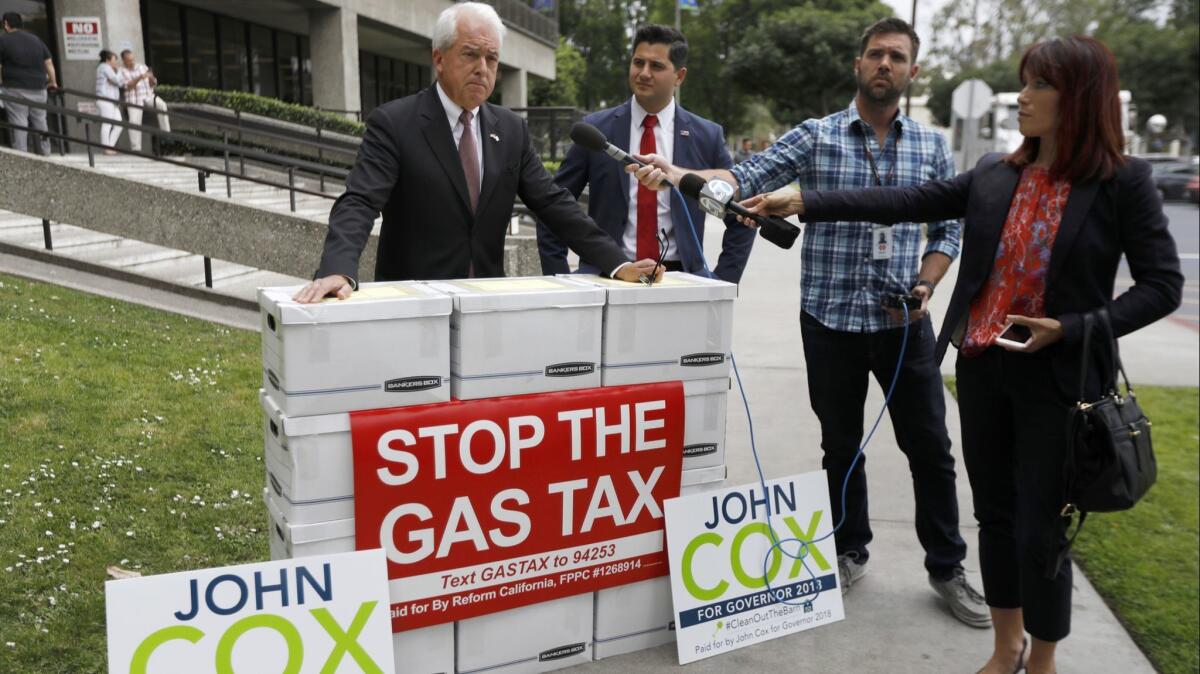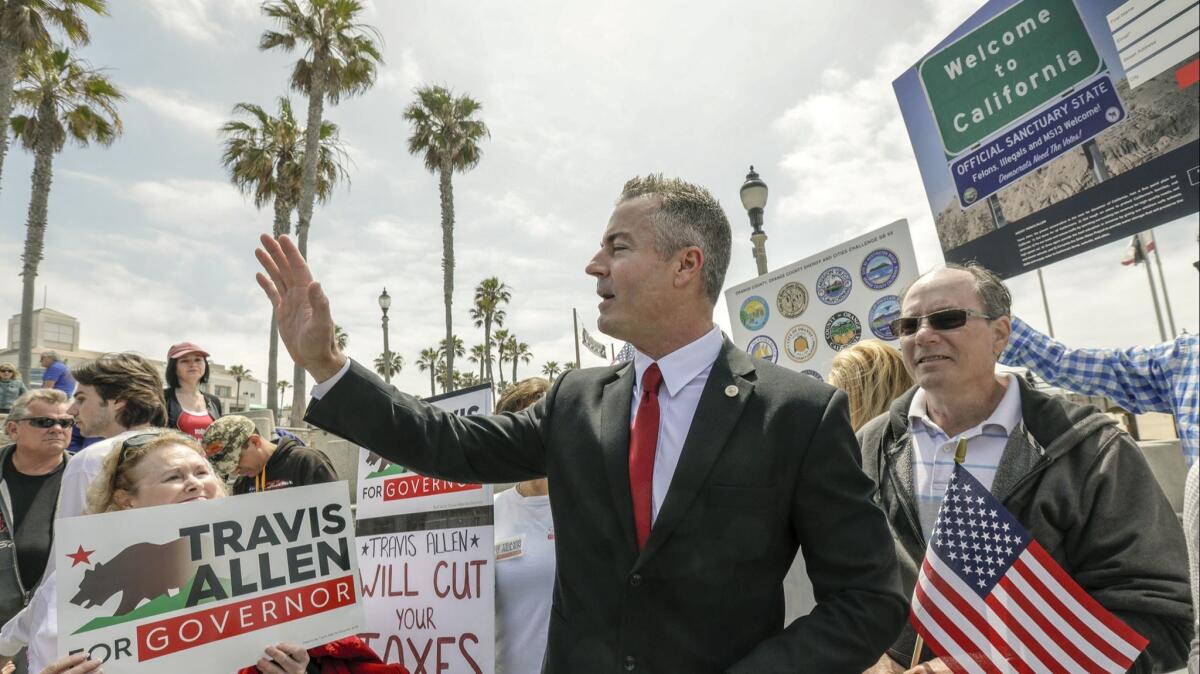How a California Republican Party endorsement in the governor’s race could help the GOP hang on to Congress
- Share via
California Republicans gathering in San Diego for this weekend’s state GOP convention find themselves in a familiar spot: scrambling for ways to resurrect a party sliding toward political irrelevance in this solidly Democratic state.
The most telling question will be whether one of the top two Republicans running for governor — wealthy Rancho Santa Fe businessman John Cox and Huntington Beach Assemblyman Travis Allen — can muster enough support to nab the state party’s endorsement.
The seal of approval may be essential for either to survive the June primary and appear on the November ballot. Propelling a strong Republican to the top of the ticket could be vital to rallying enough of the party’s voters to help candidates in tight races down the ballot, in turn boosting GOP efforts to hold control of Congress.
Conservative activists also will spend the weekend strategizing over ways to plumb voter discontent, focusing on the GOP-led proposed ballot initiative to repeal California’s recent gas-tax increase. A plan to use that campaign to cleave voters from Democratic political leaders who backed the levy has buoyed Republicans, who believe they also could win over independents and disenchanted Democrats miffed by higher costs at the pump.
Republicans hope the confluence of those political forces will generate enough momentum to stave off a Democratic uprising in the midterms fueled by an opposition to President Trump. At stake are eight vulnerable Republican-held congressional seats in California that are pivotal to the Democrats’ efforts to take control of the House of Representatives, and to recapture a powerful supermajority in the state Legislature.
“If the dust settles after the general election and Republicans lose House seats in California, they can come to the chilling conclusion it might have been because the party wasn’t able to put someone on the ballot when it matters,” Jon Fleischman, a conservative blogger and former state party official, said of the ramifications if the state party fails to put a standard-bearer on the November ballot.
The top two Republicans in the running for governor have been working feverishly for the backing of the state party, filling mailboxes, making phone calls and texting the party’s nearly 1,500 delegates.
Full coverage of the party convention in San Diego »

Allen has been scooping up local GOP party endorsements around the state, while Cox has been trying to raise his profile with voters by advertising on Fox News and talk radio. The courting will crescendo at the convention: Reminiscent of the Iowa State Fair, candidates will speak to sign-waving supporters from a soapbox on Friday and Saturday before addressing the gathering from the main stage Saturday afternoon and hosting cocktail parties Saturday night.
The California Republican Party adopted a new endorsement policy last year allowing the party to back candidates before the primary. The intent was to have the party faithful coalesce behind one candidate to avoid what happened in the 2016 Senate race when no Republican in the race won enough votes in California’s top-two primary to advance to the general election.
“You can’t get into the top one unless you get into the top two,” state GOP Chairman Jim Brulte said.
To win the endorsement, Cox or Allen must receive votes from at least 60% of the GOP delegates Sunday.
Top Republicans in the state differ on how big an impact winning the party backing will have.
Harmeet Dhillon, one of California’s representatives on the Republican National Committee and an architect of the new endorsement process, said the party nod could add 10 to 15 percentage points to a candidate’s support in the polls.
“It’s very important,” she said, adding that she did not know whether Cox or Allen would be able to cross the 60% threshold required for the party’s imprimatur. “It’s tight. People are pretty evenly matched right now.”
Beth Miller, a GOP consultant who is not aligned in the race, added that the endorsement was a particularly important signal to Republican voters who are unfamiliar with the candidates.
“Neither Travis Allen nor John Cox is very well-known,” she said.
But Fleischman, a delegate, argued that an endorsement will have little impact on the race, in part because it is happening so late. The secretary of state’s voter guide has been mailed to voters, slate mailers have been printed, and vote-by-mail ballots will start being sent out next week.
“Tens of millions of absentee ballots will drop as conventioneers are driving home. If a tree falls in the forest and no one hears it, does it make a sound? If Republicans gather in San Diego and endorse a candidate but no one knows about it, does it really matter?” Fleischman said.

Paul Mitchell, who runs the data firm Political Data Inc., says regardless of what GOP delegates decide this weekend, the fate of Republicans up and down the ballot in California could hinge, to varying degrees, on whether Cox or Allen makes it to the November election.
Mitchell expects statewide ballot measures — including allowing more rent control in California and repealing the gas tax — to increase voter turnout across a wide political spectrum. But if the November ballot offers choices only between Democratic candidates in California’s top statewide races, some Republicans could skip going to the polls. If that happens, Republicans in tight races for Congress and the Legislature would suffer.
“Republicans need a reason to turn out and vote, and having a gubernatorial candidate [on the ballot] is part of that,” Mitchell said. “Republicans don’t want to be in an environment where they’re only voting for a ballot measure.”
But hope is not yet lost for the GOP. A recent poll by the UC Berkeley Institute of Governmental Studies showed Cox and Allen vying for second place in the governor’s race, lagging far behind Democratic front-runner Lt. Gov. Gavin Newsom, but slightly ahead of former Los Angeles Mayor Antonio Villaraigosa, another top Democrat in the race. But that was before Democrats and their allies began spending millions of dollars on television advertisements.
While the campaigning heats up, the prospect of finishing in the top two in June has intensified the already contentious battle between Cox and Allen. Both claim to be the darling of California conservatives and have accused each other of craven, self-serving politics related to Republican efforts to repeal the gas tax.
Cox supporters filed a complaint against Allen with the state Fair Political Practices Commission, accusing the assemblyman of improperly using money he raised for a failed gas-tax repeal initiative to help fund his bid for governor. The Cox campaign also is airing an ad on Fox News criticizing Allen for failing to vote on legislation to provide driver’s licenses to immigrants in the U.S. illegally.
Allen has criticized Cox, a Chicago-area native who has poured $4 million into his own campaign, for his business practices as owner of a residential property management company, and has accused him of having more money than actual political support. Allen also frequently points out that while he voted for Trump in the 2016 presidential election, Cox voted for Libertarian Gary Johnson, the former governor of New Mexico. Cox since has said he now fully backs Trump.
Embracing Trump may play well in San Diego this weekend, but it could become a major liability in November.
In California, Democratic presidential nominee Hillary Clinton trounced Trump in the 2016 election, beating him by more than 4.2 million votes. On top of that, Democrats also have a 19-percentage-point advantage over Republicans in voter registration, and no GOP candidate has won a statewide race since 2006.
“Republicans in California have suffered from several maladies,” said Bill Whalen, a fellow at Stanford’s Hoover Institution and speechwriter for former Republican Gov. Pete Wilson. “Can’t win. Can’t decide who we are. Can’t decide what to do vis-à-vis Donald Trump.”
Follow California politics by signing up for our email newsletter »
Coverage of California politics »
Follow @philwillon and @LATSeema on Twitter.
More to Read
Get the L.A. Times Politics newsletter
Deeply reported insights into legislation, politics and policy from Sacramento, Washington and beyond. In your inbox twice per week.
You may occasionally receive promotional content from the Los Angeles Times.












